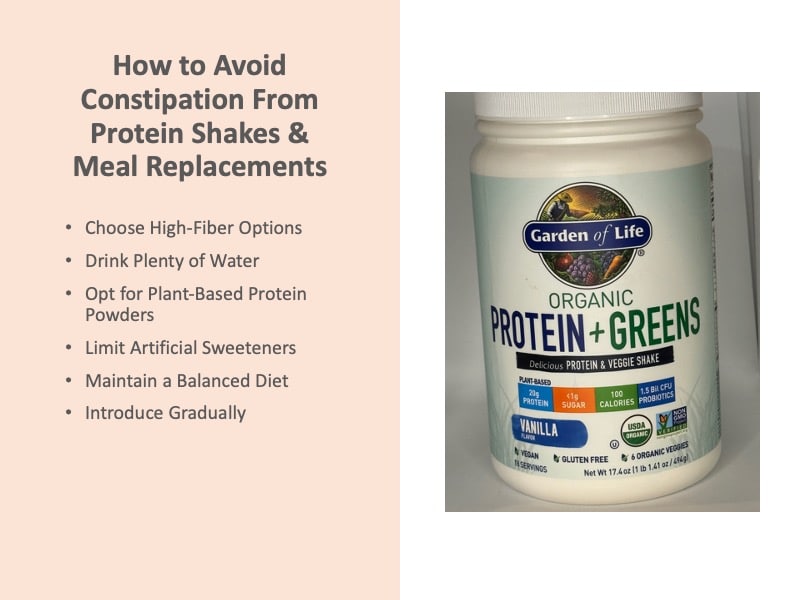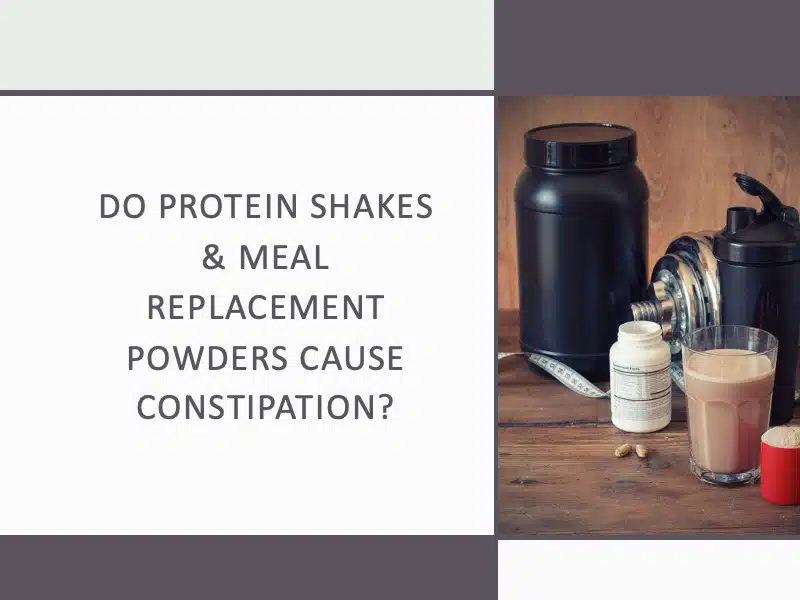Do Protein Shakes & Meal Replacement Powders Cause Constipation?
Protein shakes and meal replacement powders are a convenient way for athletes and others working on their bodies to meet their nutritional needs. However, some people report experiencing constipation when using these supplements regularly.
While protein shakes and meal replacements can be beneficial for muscle growth, weight loss, and maintaining energy levels, digestive issues like constipation are a concern for some users.
However, some protien shakes and meal replacement shakes can even improve digestion and reduce constipation!
For example, my favorite protein powder is Garden of Life Raw Protein & Greens, which contains digestive enzymes and fiber to support gut health and good digestion.
Understanding the potential causes of constipation and how to avoid it will help you get the most out of your supplements without compromising your digestive health.
Why Do Protein Shakes & Meal Replacement Powders Cause Constipation?

Constipation can be an unexpected side effect for some individuals who regularly consume protein shakes or meal replacement powders. While these supplements offer a convenient way to boost protein intake or replace meals on the go, they may disrupt digestive health for certain users.
Here are the key factors that contribute to digestive problems when using protein shakes and meal replacement powders.
No Fiber Content
One of the main reasons protein shakes and meal replacements cause constipation is their lack of dietary fiber. Many of these products are designed to be low in fiber, focusing instead on protein or other macronutrients.
Fiber is crucial for promoting regular bowel movements by adding bulk to the stool, making it easier to pass through the digestive system. Without adequate fiber, constipation becomes more likely.
Dehydration
Protein metabolism requires increased water intake to help the kidneys process the nitrogen byproducts produced from breaking down protein. If you’re not drinking enough water, your body will pull water from the colon, leaving your stool dry and harder to pass.
This can lead to constipation, especially if you’re consuming large amounts of protein shakes or meal replacement powders.
Dairy-Based Protein Powders
Whey protein, one of the most commonly used protein supplements, is derived from dairy.
People with lactose intolerance or dairy sensitivities may experience digestive issues, including constipation, after consuming whey or casein protein.
Lactose intolerance can slow down digestion and trigger gastrointestinal discomfort, leading to irregular bowel movements.
High Protein, Low Carb Diets
Many people turn to protein shakes and meal replacements as part of a high-protein, low-carbohydrate diet. While protein is essential for muscle repair and growth, carbohydrates play an important role in digestive health, primarily because they provide fiber.
Low-carb diets can limit your fiber intake, resulting in harder stools and less frequent bowel movements.
Artificial Sweeteners
Protein powders and meal replacement shakes often contain artificial sweeteners like sucralose, aspartame, or sugar alcohols (e.g., sorbitol). These ingredients can negatively affect gut health by disrupting the balance of gut bacteria, which may lead to digestive issues, including constipation.
How to Avoid Constipation From Protein Shakes & Meal Replacements

If you’ve experienced constipation from protein shakes or meal replacement powders, don’t worry—there are simple strategies to prevent it.
By making a few adjustments, such as choosing the right products and supporting your digestive health, you can enjoy the benefits of these supplements without discomfort. Here are practical tips to help you avoid constipation while still reaching your fitness and nutrition goals.
Choose High-Fiber Options
Look for vegan protein powders or meal replacement supplements that contain added fiber, such as chia seeds, flaxseeds, or psyllium husk.
Alternatively, you can mix in a fiber supplement to your shake.
If you prefer whole foods, include fiber-rich fruits and vegetables, such as berries, apples, leafy greens, and beans, in your diet to boost your fiber intake and support healthy digestion.
Garden of Life Protein and Greens is my favorite option for boosting fiber intake because it offers a perfect blend of plant-based protein and greens powder, with added fiber to support digestion.
This supplement not only provides a solid 20 grams of organic plant protein per serving, but it also includes fiber-rich ingredients like organic chia seeds and flaxseeds, both of which promote healthy digestion and regular bowel movements.
The addition of nutrient-dense greens like spinach, kale, and alfalfa further enhances its digestive benefits by adding fiber, vitamins, and minerals that are essential for overall gut health.
For anyone looking to avoid constipation while still meeting their protein needs, Garden of Life Protein & Greens provides a clean, plant-based option that helps balance your diet naturally. Its combination of high-quality protein and fiber makes it easier to stay regular, without needing to add extra supplements to your routine.
Last update on 2025-07-07 / This article includes affiliate links/Images via Amazon Product Advertising API. I may earn commissions on purchases made through these links.
Drink Plenty of Water
Staying hydrated is critical when consuming protein shakes, especially if they make up a significant portion of your daily nutrition. Aim to drink at least 8-10 glasses of water daily to aid digestion and prevent dehydration-related constipation.
If you are active or consuming more protein, you may need even more water to maintain hydration levels and support digestion.
Opt for Plant-Based Protein Powders
If dairy-based proteins like whey or casein cause digestive discomfort, switching to plant-based protein powder supplements might be a better option.
Plant-based protein sources such as pea, hemp, or brown rice protein are generally easier to digest and can offer more fiber, reducing the likelihood of constipation.
Limit Artificial Sweeteners
Consider using protein shakes or meal replacements that use natural sweeteners like stevia, monk fruit, or honey instead of artificial sweeteners. Artificial sweeteners can cause digestive imbalances and may contribute to constipation.
By choosing products with cleaner ingredients, you can protect your gut health and avoid unwanted side effects.
Maintain a Balanced Diet
Protein shakes and meal replacement powders should complement a well-rounded diet, not replace whole meals entirely.
Ensure you’re consuming enough vegetables, fruits, whole grains, and healthy fats to promote optimal digestion and bowel regularity.
A diet rich in diverse nutrients will help your digestive system function smoothly.
Introduce Protein Supplements Gradually
If you’re new to using protein shakes or meal replacement powders, it’s important to ease them into your diet. Start with smaller servings and gradually increase the amount to allow your digestive system to adjust.
This slow introduction can reduce the risk of constipation and other digestive issues.
Last update on 2025-07-07 / This article includes affiliate links/Images via Amazon Product Advertising API. I may earn commissions on purchases made through these links.
Read Next: Best Protein Powders at Walmart
This website does not provide medical advice. This website site does contain affiliate links, and purchases may earn a commission.
Read my Medical Disclaimer, Review Disclaimer, and Publishing Policies for more details. Use of this site indicates acceptance of these terms.




